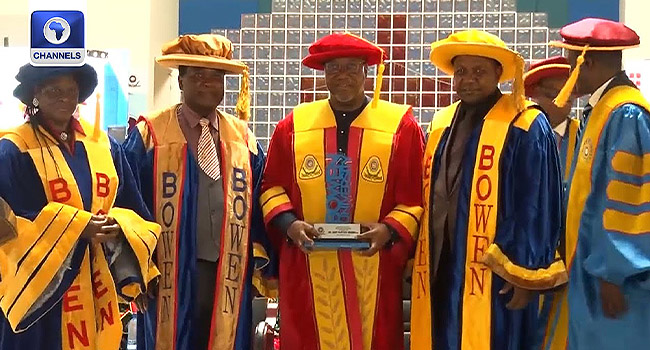
Presiding Judge George Gelaga King said Taylor had aided and abetted crimes committed by Revolutionary United Front and Armed Forces Revolutionary Council rebels, advising and assisting them while knowing well the kinds of crimes they were committing.
“Their primary purpose was to spread terror. Brutal violence was purposefully unleashed against civilians with the purpose of making them afraid, afraid that there would be more violence if they continued to resist,” he said.
“Governments and the international community were also afraid that unless the RUF and the AFRC demands were met, thousands more killings, mutilations, abductions and rapes of civilians would follow.”
Taylor, 65, dressed in a crisp suit, sat impassively throughout the reading of the appeals judgment at the U.N.-backed Special Court for Sierra Leone in The Hague.
He is the first head of state to be convicted of war crimes by an international court since the Nuremberg trials of Nazi leaders after World War Two.
Taylor was also found guilty of crimes against humanity committed during the 11-year conflict in Sierra Leone, which killed some 50,000 people and left tens of thousands mutilated, their fingers, hands or limbs chopped off.
Prosecutors said he used the proceeds from so-called blood diamonds mined in the conflict zone to finance his activities, which included advising and helping the rebels.
“This verdict shows no person, no matter how powerful, is above the law,” said Brenda Hollis, the court’s prosecutor.
In Sierra Leone’s capital Freetown, victims were jubilant.
“It’s a victory for me against tyranny,” said Edward Conteh, whose hand was cut off by rebels. “I’m happy Charles Taylor is behind bars for 50 years because I’m a victim of the war.”
But Morris Anyah, Taylor’s lead defense lawyer, said Taylor would not have been convicted if he had had a powerful ally.
“If Charles Taylor had had a friend among the permanent members of the U.N. Security Council, this case would not have had the traction it has had,” he said, adding that Taylor had received the final verdict with great stoicism.
Britain has agreed Taylor can serve his sentence at one of its maximum-security prisons but Anyah said Taylor hoped to serve his term in Finland, Sweden or Rwanda – the other three countries which have enforcement agreements with the court.
“DIRTY PEBBLES”
During Taylor’s four-year initial trial, judges heard accounts from Sierra Leone civilians who had been mutilated by rebels or who had seen their close relatives murdered.
They also heard evidence from supermodel Naomi Campbell, who was questioned about blood diamonds Taylor was accused of having sent to her hotel room. She described the objects she received as looking like “dirty pebbles.”
In Liberia, Taylor’s supporters denounced the court and its permanent successor, the International Criminal Court.
“This is complete international gangsterism,” said, Cyril Allen, former secretary general of the National Patriotic Party. “The ICC was set up for Africans, to intimidate them and get their resources.”
The very idea of international courts has come under fire across Africa. The ICC has been accused of neo-colonial meddling in Kenya as it pursues cases against its president and deputy president.
Several African states are considering withdrawing from the ICC, which has only ever prosecuted Africans.




